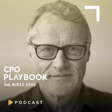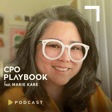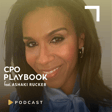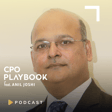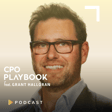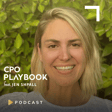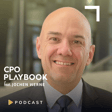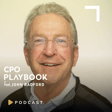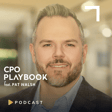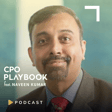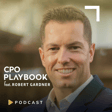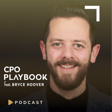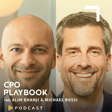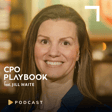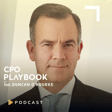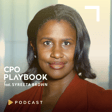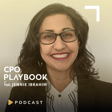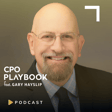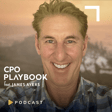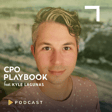Become a Creator today!Start creating today - Share your story with the world!
Start for free
00:00:00
00:00:01

Best Leadership Insights 2023 (Part 1)
Let's dive back into the most insightful moments from CPO PLAYBOOK podcast! We’re revisiting highlights from our compelling conversations with HR leaders, executives, and visionary thinkers. From the evolving role of Chief People Officers to championing Diversity, Equity, and Inclusion (DEI), our guests, including Colleen McCreary of Credit Karma, Dr. Todd Kashdan from George Mason University, Ann Le Cam from Walt Disney, Stephan Le Cam, President of Logoden Advising, and Hugo Veiga and Diego Machado from AKQA, share profound wisdom.Get plugged in for top HR trends, leadership insights, and practical advice on building thriving organizations. Don’t miss this chance to hear from the experts driving the future of work!
Transcript
Introduction to CPO Playbook Podcast
00:00:05
Speaker
Hello, everyone. I'm Felicia Shakiba, and you're listening to the CPO Playbook Podcast. Join me and my guests as we feature insightful conversations with HR leaders, people scientists, and executives from diverse industries and functions, offering valuable perspectives on the future of
Exploring Innovative HR Strategies
00:00:23
Speaker
work.
00:00:23
Speaker
Discover a unique outlook on navigating the complexities of the modern-day working world. Exploring innovative strategies in talent management and corporate culture from the chief people officer's perspective. Tune in to stay ahead of the game when it comes to all things people related.
The Evolving Role of Chief People Officers
00:00:45
Speaker
In 2023, our journey has been nothing short of extraordinary. As we wrap up an eventful year, we're taking a moment to look back. We've explored the evolving role of the Chief People Officer, uncovered the competitive value of diversity, equity and inclusion, and learned how to foster a values-driven culture.
00:01:04
Speaker
that attracts big names like Netflix and icons like Usher.
Key Takeaways from HR Leaders
00:01:09
Speaker
Today, we're sharing some of the best moments from our episodes this year. We'll feature clips that highlight key takeaways from interviews with Chief People Officers at Credit Karma and BuzzFeed, alongside insights from thought leaders at Walt Disney and Intuit, and successful executives whose leadership strategies have been pivotal in sculpting their success stories.
00:01:29
Speaker
Mark your calendars for our upcoming two-part holiday and New Year's special on the CPO Playbook Podcast.
Is HR Leadership Outdated?
00:01:40
Speaker
When we began the show this year, Colleen McCreary, the former chief people and communications officer at Credit Karma, led the charge as our debut guest in episode one. Her authenticity and candidness set a real tone for the conversations ahead. In this clip, she speaks on challenges faced by HR leaders due to legacy, outdated reporting structures, shedding light on an issue that many might hesitate to openly address. Take a listen.
00:02:11
Speaker
But I think when we've tucked the HR leader underneath a country manager or we tucked them under a president or those types of things, it really puts that person in an awkward position to have to try and advocate for the right thing or hold that leader accountable for the behaviors and how they're acting as leaders.
00:02:30
Speaker
It's a way better scenario to have that person be a peer. And when you have a challenge or when you are at odds that you can handle that directly as leaders together, just optically for your employee population. I think if you're a company that has said employees are our most valuable resource or the employees are the most important thing or we care about our employees more than anything else, you don't have somebody who is thinking about your employees all of the time reporting into your CEO.
00:02:59
Speaker
I don't think any of those statements can really be true. Now you're even starting to see the CPO report to the board of directors, just like the CEO, because there are companies that are saying, I really want to hold not just the whole management team accountable, but I think it's going to be better if the CPO reports to us because we can also hold the CEO even more accountable.
00:03:21
Speaker
Colleen's episode sparked serious contemplation among board members, yet their focus hasn't been solely on that.
The Competitive Edge of DE&I
00:03:28
Speaker
The uphill struggle of championing diversity, equity, and inclusion isn't news just to HR professionals. Employees also face the challenge of persuading leadership about its value. However, Dr. Todd Kashtan, a distinguished psychology expert and professor at George Mason University, shared compelling evidence highlighting the significance of D-E-N-I.
00:03:50
Speaker
emphasizing its benefit in providing competitive edge to businesses. I know a lot of organizations are focused on we need the numbers of women in tech or different ethnicities in certain places or functions of the organizations beyond that succession planning or promotions.
00:04:09
Speaker
workplace culture or even having that distribution of voices within the organization. What is the benefit to all of those things beyond hearing the ideas and voices? What is the end goal for an organization? What are they going to do better than their competitors with this distribution of diversity or increase in belonging and inclusiveness?
00:04:29
Speaker
I mean, Felicia, you just asked the question that every single organization that invests in, whether it's diversity, equity, inclusion, or now the term is diversity and belonging, whatever that is, they should be asking themselves that question and making sure there's a concrete answer. So if we go back a couple of years,
00:04:48
Speaker
The answer was this is an end in itself. And I think your question is a really important one, which is it's not. It's not an end in itself. The only way you can figure out whether you're making inroads towards these things you value is that you can measure and assess them in some way. If the end goal that you have is you want to have a representation in your group of people demographically that is close in proximity to society,
00:05:17
Speaker
then you have to explain, well, what's the reason for doing that? Now you could say it's fair, and then you could ask yourself, so in this group though, why is fairness important? And you should be going down that hole, not be as a philosophical exercise that you would do in your philosophy 101 class, because you were going to have to track
00:05:38
Speaker
You're going to have people that aren't sure that this is the path to go. And you should be able to clarify the reason that we want to have a potentially equal distribution of men and women is because we know that if you have one woman in an organizational group, they are more likely to feel excluded on the outside, less likely to share their views and feel as if it is an us versus them mentality. Just the inclusion of a second woman in a group.
00:06:06
Speaker
has this transformative effect where now there is a faction where they can feel as if because there is another person, we are a block, a voting block in this group. And so we feel empowered. We have a sense of agency where we are willing to challenge ideas that we think are foolish and share ideas that we think are fortunate.
00:06:28
Speaker
Dr. Kashtan's insights truly resonated with me regarding the value of D.E. and I. But shifting perspectives is no easy feat.
Cultural Transformation Challenges
00:06:37
Speaker
It's a process that demands time and heaps of patience. Welcoming Anne Lacombe to the show was a stroke of incredible fortune as she expertly guided us through the intricate steps of cultural transformation.
00:06:50
Speaker
Anne Lacombe's background as an executive fellow at Harvard Business School and former senior vice president of studio planning and talent at Walt Disney Animation Studios made her perspective incredibly valuable. What advice would you give to leaders who are currently working through a cultural transformation?
00:07:10
Speaker
It's not an easy journey. You have to be very resistant. You have to allow the time for change to happen. And my words of advice would be competent and confident and be consistent. Because cultural change happens when everything starts coming together in a logical way. That could be
00:07:31
Speaker
the work you're doing, the processes you're having, but also the policies you have as an organization, how your building is laid out, what your habits are as you come together. And when that consistently starts sending signals that change is going in the right direction and that people can speak freely and shouldn't be worried and there's psychological safety, I think that's where change happens. Is there anything that you want to talk about we haven't touched on yet?
00:07:59
Speaker
Yeah, I wanted to talk a little bit about the importance of understanding the problem. Staying with the problem long enough before starting to go to solutions. And especially in cultural change, people will start throwing out ideas and start doing things. But sometimes without having spent sufficient time analyzing the problem. What's at the core of this? And it's a little bit like peeling an onion.
00:08:22
Speaker
where you see certain behaviors and you're wondering why they are behaving that way but it's actually something deeper underneath and we start fixing the symptoms rather than really understanding the problem. As a leader in an organization I always keep saying to my teams fall in love with the problem. Don't go to the solution too quickly.
00:08:42
Speaker
stay there and make sure you have the right problem because if you fix that one things will unfold a little bit like a flower but if you're fixing the wrong one it'll just be a leaf and fall off. I think that's really important as we listen to not listen necessarily to the ideas that people are suggesting to us because then you will sit with a hundred ideas and you can't implement all of them.
00:09:04
Speaker
But really look at all these ideas and see what do they have in common? What problem are they trying to solve? And when you can find that, I think you can find richer solutions and more impactful movements in your cultural transformation process.
Leadership in International Environments
00:09:21
Speaker
As if Anne's insights weren't remarkable enough, you'll also get the chance to hear from her incredibly successful husband, Stéphane Lacombe. Stéphane wears multiple hats as the president of Logan Advising and Elevation Investment Management and Funds. His work takes him to Africa, where he develops renewable energy investment solutions for local financial institutions
00:09:46
Speaker
Having a non-HR leader on the show to illustrate the application of how leadership development influences success was pivotal. And so, Stefan generously shares his most crucial and valuable leadership skill that distinguishes him from his competition. And it's not customer focus.
00:10:06
Speaker
As a successful entrepreneur in the field, how have your politically savvy skills played a role in navigating the complex political landscape in Africa? Can you share an example of a situation where your political acumen was crucial to the success of a project?
00:10:25
Speaker
a very good question because often it's all about it enough. It's finding the right local partners. And among those local partners, it's not only the economical and financial collaboration on the ground in the country, it's a lot of
00:10:41
Speaker
political and political relationship where what's happening is that those infrastructure investments are very important for the governments and political leaders to show the local act. You will be surprised how much we are being interrogated one year before any general elections where
00:11:03
Speaker
political forces, local forces want to show and demonstrate that they are active for the population and want things to change. And so that relationship has to be very well established with the Ministry of Energy, with the Prime Minister office, the President's office, depending on the countries. We get into those negotiations with them. Also has to be handled the
00:11:29
Speaker
very often there is some form of embedded corruption. What I mean by that is that local politicians want to know how they can benefit from an investment, so sometimes it's very direct, they want to receive some proceeds of an investment on which we are very firm, we're not going that direction, but some others it's more
00:11:50
Speaker
How can you support my next election? How can you contribute to my actions to the countries? And this is where we get into some form of a thorough conversation where we, for example, in Zimbabwe, we developed a school close to a small solar park we developed. And we were actually, it was a great experience. It was a beautiful local community school we developed for the local populations.
00:12:19
Speaker
and everyone was happy. We were the local politicians and the community was, you know, that kind of very good collaborations where at the end of the day, positively you can help local political forces, which are very important for us and for the project in cloud.
00:12:35
Speaker
without falling into straight corruption and things we don't want to be engaged in. It's very important to find, engage the conversations and find the way to provide services to these local forces, political forces, which are very important for the project to take place by supporting and helping them without falling to the dark side of the spectrum.
00:13:05
Speaker
Stefan's clip really hit home, emphasizing the crucial need for values in
Values-Driven Business in Sao Paulo
00:13:10
Speaker
leadership. That led us to an episode featuring Hugo Vega and Diego Mercado, the co-global chief creative officers at AKQA, a WPP company.
00:13:20
Speaker
This particular episode truly stood out as one of our best. What they achieved resonates deeply with what we advocate at CPO Playbook Consulting. They embedded values with absolute dedication while establishing the Sao Paulo office from scratch. Their success speaks volumes as they attracted powerhouse clients like Netflix, Google, Usher, Lady Gaga, and so many more.
00:13:51
Speaker
It sounds like the key to your growth and success was focusing on the people that you brought under your roofs, not necessarily the work, but essentially you're saying that the work will come as long as we find people with the right values that fit the culture of what we're trying to build for the future. Exactly. You know, when you start the business, everything is just, it's a vision. So it's a speech. Oh, our intent is to do this or to do that. So,
00:14:20
Speaker
The way that people believe and you get the team's trust is by actions. So there was just an example that is very iconic on the way that we operate. We won a Grand Prix at the Clio International Award. And so we didn't have a lot of money, like we were a small studio.
00:14:38
Speaker
But we found, like, we're going to fly everyone that participated on the project. So it was the strategy, client service, the editor. We're going to fly them. So we found, like, the cheapest flight. We would go through Panama. It felt like, I don't know, six hours there, connection. We rented a big Airbnb, and everyone went on stage. So this is an example of
00:15:04
Speaker
show it to everyone. It's not that, oh, we are a creative agency and the creatives are, no, this actually is a collaborative process and everyone plays a role on seeing an idea get into the world. So these are the things like you might have a strong vision, but it's on the day-to-day on the actions that you do, then everyone
00:15:29
Speaker
understands like this vision is being implemented every day on our day to day. Yeah, the small acts will build the culture. It's not like a big downhole every year that will change from left to right or from this direction to other. It's like this is, we call it small things, but like because there are quick decisions, but like they're not small, right? Like they become the big things.
00:15:54
Speaker
So these decisions of flying the team was like something very, oh, we have to go now. Let's do it. And then I think this just brings consistent of the mindset. So we don't need a book saying, hey, every time you win awards, you have to fly everyone, da, da, da, da, da. Or every time you present, who jumps inside the room, who presents what? There's no, there's not like that. So we have the mindset and it adapts through time.
00:16:24
Speaker
through different moments and different situations. I think that is lots of going back to the Radiohead or the collaborative process that Hugo is mentioning.
00:16:36
Speaker
This is how we like to be creatives. Just by one opportunity or by one decision, the best we landed in advertising, but like we are creative people. We like to do creative stuff. We would like to create things. Maybe one day is a film or a Super Bowl, the other day is a song, or the other day like creating a new dish. So I think we like to explore that.
00:17:01
Speaker
as everyone here has won their work with us like are like that. So I think like we started like also exploring how can we take AdWords or like the agency world or EKQA world to other boundaries. So how can we start working with musicians? We don't see other companies working
00:17:22
Speaker
beyond music labels or those. How can we be at the learnings and the strategy and our best skills that we craft with Netflix, with Nike, with Google, and all these clients? How can we take that to partner with musicians? So I started thinking, how can we
00:17:41
Speaker
What learn from these other creatives? How can we learn from an architect, from a chef, from a graffiti artist? But also, how can we collaborate with them in bringing the knowledge, the skills that we use for Nike, for Netflix, for Google, for all the brands that we already work? How can we bring these skills and this knowledge?
00:18:02
Speaker
to artists, to a chef, to architects. So we started getting closer to this and making like events and inviting them to the house. And I remember in the first, in the beginning, like one of the first or second year, we brought like a chef to make like a special dinner in the office. So we have like special guests. We have like 200 people, three days in a row, like a massive dinner here. And it was so nice, so inspiring to see the process of like designing the house as a restaurant.
00:18:32
Speaker
Which dishes are you creating? How will you present the dishes? What's the name of the dishes? How will you tell the story? And then we started bringing musicians. We made like a few small concerts here in the office and from there we started meeting musicians. We did like an album over for one artist and then we started creating a script for a music video and boom suddenly I just said at the mail, hey
00:18:58
Speaker
Usher wants to work with you guys. It's like, what? Like, which Usher? Is he Usher? Or like, what do you mean? And suddenly we were in a nice card call with Usher and his manager and he was sharing like a brief. Like, oh, I have this song. I want you to do this and this and that.
00:19:18
Speaker
And then was one of our first global projects in music. And I think like from that, like we never stop it. Like going from Usher, Lady Gaga, Elton John, like some local artists going for music videos or album launches or festival events.
Conclusion and Teaser for Part 2
00:19:39
Speaker
That's the Best of 2023 Part 1. Be sure to follow the CPO Playbook Podcast to listen to next week's episode, Best of 2023 Part 2. Happy Holidays.
00:19:59
Speaker
If you like today's podcast, we have more podcasts on innovative HR strategies, talent management, organizational culture, and more, and how to navigate the complexities of modern day HR. Find them at CPOplaybook.com slash podcasts or search CPO Playbook on Apple podcasts, Spotify, or wherever you listen. Thanks for listening to the CPO Playbook podcast. We'll be back with a new episode next time.
00:20:30
Speaker
I'm Felicia Shakiba.
00:20:50
Speaker
And if you have an idea you would like us to talk about or a guest you'd like to nominate, visit cpoplaybook.com slash contact us to suggest an idea.
